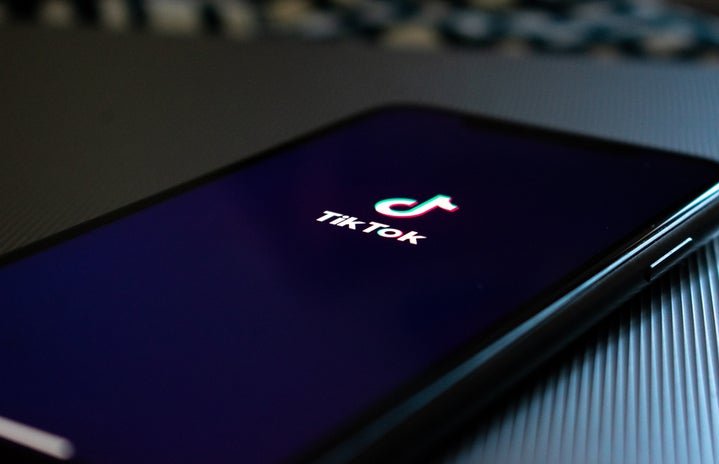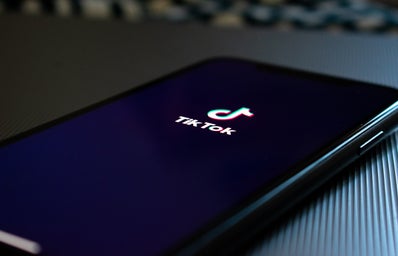Trigger warning/ mentions of Andrew Tate, Eating disorders, self-harm, grooming
TikTok, one of the most popular apps among young people. Previously named Music.ly, it used to be home to dance crazes, slime videos and cooking tutorials. When everyone was locked down, it also became a social hub for friends to learn and compete as well as becoming the best-time killing app.
As with any social media, influencers hopped on the app. With the similarities to older apps like Vine, it was easy to use and people like Charli D’Melio blew up fast amassing thousands of followers in days. However, as things started opening back up, Tiktok became more of a social media outlet than an entertainment app, with politicians such as Boris Johnson joining with an official Number 10 account.
TikTok has always been used in tangent with politics, for example a Gen Z wide protest which included reserving free tickets to rallies making the news as advertised ‘sold out’ events became empty. Arguably the most left wing generation, it became a place to criticise policy in a fair and constructive way as well as being a safe space for LGBTQ kids to express how they were feeling and receiving support from all over the world. It became a positive place to express and find new ideas on how to dress with good-natured memes such as ‘Gamers against VSCO girls’ and the rise of the ‘alternative style.’ All in all, a positive place to be, if you were looking for positivity.
Tiktok’s algorithm, a subject which is the defiant sore spot for the app, makes it so every video you like or interact with changes what you see on your ‘for you’ page. As part of this article, I created a new TikTok account linked to a brand new google email. I liked a few videos on the new ‘Prime’ drink as well as football edits and within a few swipes, that was all I was watching. It’s incredibly easy for the content you watch on TikTok to change within minutes.
Trolling has always been a horrible part of being online, and unfortunately a common one. With TikTok’s insane virability, it means that thousands of people can see and comment your video in minutes and if even a small percentage of people are saying something unkind it can take an enormous toll.
Accounts like ‘Libs of Tiktok’ an alt-right account reposts videos, usually from the LGBTQ+ community, framing them in an incendiary light to incite hate and outrage from the right. The individuals behind it creates content including shaming teachers who come out to their students and for them to be sacked on the spot. Being featured on this account without permission has caused multiple American teachers to be fired. These videos reach millions and have been featured on Fox News and endorsed by Joe Rogan. This is just one of many accounts that actively hunt on TikTok for people they disagree with and if exposed to a young impressionable audience, can be very damaging.
A content creator that recently hit the news is Andrew Tate. Banned on Tiktok, Instagram, Facebook and until recently Twitter, Tate hit mainstream media when he was arrested for sex-trafficking, rape and assault in Romania, a place he moved to after living in Luton for a number of years. However, Tate has been an online influencer for many years, spewing hate and endorsing abuse against women. His one claim to mainstream fame is being on Big Brother in 2016 where he was kicked out early because of a video which showed him beating a woman with a belt, along with several racist and homophobic comments on twitter.
Tate is a self-professed millionaire with his main source of income being an online platform where he operated a cam website with his brother Tristian, where they both used their girlfriends to make money. Said girlfriends are now claiming that the brothers manipulated them into stripping on camera.
However, Tate is not the one posting these viral videos. His followers are repackaging interviews and podcasts in which he features and uploading them faster than TikTok can take them down. He famously says that ‘depression isn’t real’ and says that rape victims bear responsibility for their own assaults. This dangerous rhetoric along with the endorsement of the abuse of women is packaged neatly into 30 second videos pushed onto young men and boys algorithm.
As previously explained, it’s incredibly easy to cultivate your TikTok experience and so with one like, young boys can be exposed to a toxic culture that is incredibly manipulative and shape their worldview into something dangerous to themselves and others. With the rise of these influencers, it teeters on the edge of harming the fundamental rights that women and girls have fought so desperately for and still fight so desperately for. By showing these attitudes in a positive light to children when they are younger, it puts back so many movements that have pushed the glass ceiling as well as rebuilding negative attitudes that could’ve been all but erased.
Is there evidence of Tate being influential in schools? Yes. A school in West London, has held assemblies warning students of the hateful rhetoric that Tate spews. Mr Adams in speaking to the Independent said that, ‘“Tate’s speeches not only scream of toxic masculinity, misogyny and victim blaming, but they express a deep lack of care for other people as human beings.” Another teacher, Ms Carson said while speaking to BBC News that, ‘A pupil told her that they would still admire him (Tate) if he was found guilty of the charges he was accused of.’ This is a terrifying admission to hear from a classmate especially if you are more likely to be targeted by this rhetoric.
But not all of the people consuming his content are aware of Andrew Tate’s vile views. The recent tilt in fame has become subject to a meme in which people ask each other what colour their Bugatti is, originating from Tate. But as previously stated, if people, usually young boys interact with this content, they’re fed more titbits of this ideology, leading to young people more easily falling down the alt-right rabbit-hole than ever.
Overall TikTok’s algorithm is doing more harm than good. Moving away from misogynistic influencers, along the other side of the spectrum are bodily issues such as eating disorders and self-harm.
Aimed at women and girls attempting to get a ‘perfect body’ the rise of trends that promote disordered eating packages small health tips with outright lies about food. The ‘trends’ that promote unkind and unhealthy thoughts about bodies and what they need.
The pink, preppy colours mixed in with self-affirming language contributes to its largely female demographic. Trending searches like ‘Hello Kitty Self-Harm’ provides young people a ‘cute’ way to harm themselves and provides ‘new’ ways to cause upset.
Videos of people asking how to remove blades from sharpeners are accompanied by hundreds of comments explaining how in detail, all accompanied by the tags of #sh or #s$lfh@rm to avoid TikTok’s scrutiny. Instead of this horrible advice being actively searched for, it’s passively provided all to the soundtrack of the latest sped-up pop song. Passive suicidal idealation is joked about beyond dark humour and it is encouraged to live life on the edge. Scrolling through, it can go from dogs to negative self-harm alternatives to how to best disguise blades.
Tiktok has become a breeding ground for the extreme and young children, most of whom aren’t even supposed to be on the app, are the main victims.
According to the NHS, the proportion of 11-16 year olds with possible disordered eating has gone up from 6.7% to 13% (almost double) and from 44.6% to 58.2% in young adults that are 17-19. A crazy statistic that reflects the effects of social media and TikTok really reflects the horrors of how bad it can be. However, it’s not just posting that affects young people.
Adults and children have always been able to use social media alongside each other. The general age of most apps is 13 but parents and carers have allowed younger children to bypass these unsanctioned guidelines, the most famous example being Kim Kardashian and her daughter sharing their joint account with comments off.
With young children being exposed to the internet early, the realm of dog videos and makeup tutorials can so easily be left in the past.
Monatasition and the exploitation of this system is seen in its livestreams and content creators are able to message fans within the app itself. In June of last year, for example, a 36 year old man was sentenced to prison after grooming two 8 year old girls on the app. He was sentenced to four years and to be on the UK Sex Offenders list indefinitely. The app is home to so many children, with parents and carers who don’t have the tools, knowledge or resources to prevent such things happening.
Harmful words are tagged with symbols to avoid detection and unharmful words such as ‘lesbian’ also have to be used with symbols to avoid being taken down. Synonyms for killing such as ‘unalive’ or ‘unaliving’ have spread about the platform making serious crimes like murder more digestible for the algorithm. The desensitising of these words has numbed young people to murder as well as viewing things like being gay as harmful, which it’s not.
This need to be seen and go viral has become dangerous. Influencers are pushing more and more harmful stereotypes and ideas to younger and younger children and impressionable minds.
So what are the benefits of TikTok? Is it really enough to outweigh the harm it does? In short, no. Not at all. But the positives of the platform have changed lives. A small amount of lives but with the negatives there are always a small amount of positives. The ability to go viral lures in people filming and uploading their personal stories to the platform, and being able to earn a life-changing amount of money from empathetic viewers. Scams take up a lot of these stories with many people faking, taking money and deleting their accounts to never be found.
A true positive of Tiktok is that a well-cultivated page can be uplifting. It can fill the doom scrolling with motivational quotes or places in the world that are a secretive beauty, family businesses and small businesses being able to live doing something they love and adore. As well as classic, feel-good animal videos, shelters are able to advertise to a wider demographic and make it easier for animals to be adopted and saved from being euthanized.
To combat the horrible-ness I’d like to end this deep-dive into TikTok with a positive note. Although social media can be a stew of hot trash, it helps people connect, it helps people know that they are not alone, and although the danger is always there, it is easier than ever to access the help you may need. There are hundreds of positive cases out there where TikTok and the community that uses it do amazing things and benefit people. Cases where family restaurants have blown up on Tiktok and now are rammed with customers are one example of this. You just have to know where to look.
Since doing all of this research, it has really opened my mind on how much information we’re force-fed on an app that’s primarily used for entertainment and I definitely will be taking second guesses on the content I consume.
As always, stay kind and stay safe! <3
Source list
- https://www.washingtonpost.com/technology/2022/04/19/libs-of-tiktok-right-wing-media/
- https://www.theguardian.com/technology/2022/aug/06/andrew-tate-violent-misogynistic-world-of-tiktok-new-star
- https://www.theguardian.com/us-news/2022/jun/13/drag-queen-event-stormed-men-believed-proud-boys-group-california
- https://www.independent.co.uk/news/uk/home-news/andrew-tate-social-media-gateway-drug-b2260309.html
- https://www.bbc.co.uk/news/education-64234568
- https://www.insider.com/man-jailed-tiktok-grooming-children-uk-2022-6
- https://digital.nhs.uk/data-and-information/publications/statistical/mental-health-of-children-and-young-people-in-england/2021-follow-up-to-the-2017-survey


